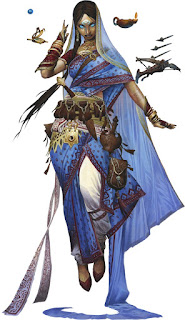So in theory, I shouldn't like the psychic class either, as it is similar in many ways. But I've been playing a psychic for a while now, and I am really enjoying it.
 |
| Illustration by Tomasz Chistowski |
The main reason I wanted to try playing one is a spell called Burst of Adrenaline, which gives a massive boost to a physical score (Strength, Dexterity or Constitution) for one round, with the drawback of being fatigued on the next round. It's like a mini version of the barbarian's rage, and is one of the few spells in Pathfinder that you can cast as an immediate action (an instant spell for those of you who play Magic). Just by itself, it made me want to try out the new 'psychic magic' rules.
Like a sorcerer, the psychic is a full nine level spellcaster with a bad attack bonus. It also has a sorcerer-bloodline-like feature called a psychic discipline, that grants a small number of bonus spells and spell-like abilities. Like the sorcerer, their magic is innate rather than learned. But unlike a sorcerer, who uses charisma, their magic is keyed off of intelligence.
The psychic is very much a master of the mind, and even though they have innate magic, there is the feeling that it is not just handed out to them - it still requires intense study and discipline to pull off the the things they do. And perhaps that is part of the reason I like them so much, as it doesn't quite feel like your character just won the genetic lottery.
 |
| Illustration by Rogier van der Bank |
Psychics have another class feature, borrowed from the sword-and-sorcery magus class - a phrenic pool they can spend to amplify their spells, though, theirs is less flexible than the magus' arcane pool.
The psychic has a number of advantages over the sorcerer. Many sorcerer spells require the sorcerer to actually aim at the target, requiring an attack roll. These 'ray' spells usually ignore armour, but even with that bonus, a sorcerer can miss and waste the spell. Psychics hardly have any ray spells, most of their stuff just hits, because, they're messing directly with the opponent's head. Couple that with the fact that their signature spell mind thrust easily out-damages magic missile, and they start to look rather scary.
The sorcerer's arcane magic has verbal and somatic components - basically, you need to be able to speak the magic words and move your hands in the correct manner to cast your spells. All very Harry Potter. This means that sorcerers can't wear much armour, which restricts movement, and if you can silence them or stop their hands moving you can shut them down completely.
But the psychic uses psychic magic instead of arcane magic, which requires thought and emotion components. Tying up a psychic's hands is ineffective, and casting silence on them does nothing to stop their magic. In fact, psychics can actually cast silence themselves, and it's actually a good strategy for them drop a zone of silence if they find themselves duelling a wizard. In addition, they can wear full plate armour without it messing up their spells.
 |
| Illustration by Wayne Reynolds |
This all seems pretty powerful - and it is - but psychics do have weaknesses. Like the witch, their reliance on mind-affecting spells means that they struggle against stuff that is immune to mind magic, like plants, vermin, constructs and - undead. And you tend to fight a lot of undead in Pathfinder. While they can circumvent the undead thing by learning an ampification, it's still something they have to spend extra resources on doing, and they still get stuck being useless against the other mindless stuff.
They are also lacking in the AOE department, not having access to things like fireball, lightning bolt, or the ever-popular burning hands. The only decent spell they have for this is sonic scream, which has it's own drawbacks.
Their spellcasting can be shut down by anything that messes with their emotions, like the rather common monster ability to cause fear, and their thought components make concentration checks nearly twice as difficult unless they spend actions clearing thier mind. Good like with casting that spell defensively.
 |
| Illustration by Wayne Reynolds |
Overall, I think the class is really well made and pretty balanced. In addition, it doesn't feel like any other Pathfinder class (even though it heavily borrows ideas from a few) and so carves out it's own little space. And it's a really fun space. Did I mention you get to make heads explode?

No comments:
Post a Comment